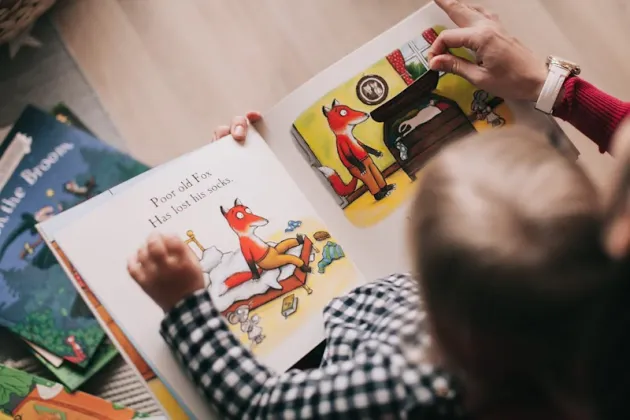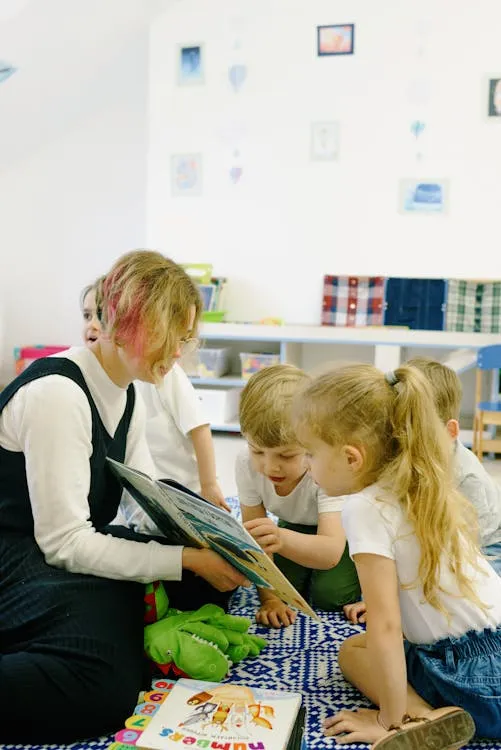Five Things To Know About Reading With Your Child
Published on 29th May 2024
1. Relax
Being able to read is no doubt an important life skill. Reading is seen as a valuable activity, as something that is good for your child. And it is! But like with anything that is beneficial to our children, we parents tend to, consciously or unconsciously, put ourselves under pressure to, “get it right”.
Am I reading enough to my child? Did I pick the right books? Is my child actually learning anything from this or am I wasting my time?
If we only have the benefits of reading and the desired improvement of our child’s literacy skills in mind, an enjoyable activity quickly turns into a chore for both parent and child. Children from a very young age are intuitively good at knowing if we have a secret agenda, so the best thing to do about reading is to relax and enjoy it! Pick books you and your child will enjoy and allow yourselves to read for pleasure.
There is nothing wrong with reading to practise literacy skills. Many parents with children of school age will be familiar with PM Readers which are send home from school, designed to improve reading skills. They are important to help the child to gain confidence in reading and can be part of the reading routine. I usually let my son read his PM Reader to me before he can pick a book that I read to him; thus, practise and pleasure are combined.

2. It’s never too early to read to your child
At the end of a sensory story time which I recently did for Dublin City Libraries, a mother smiled at me apologetically as she was putting her 6-month-old daughter back into her buggy. “She is a bit too young maybe, but she really enjoyed it . . .”
I assured her that children are never too young for stories! You might not get a book read to a baby like you would to an older child – the book will probably be more in their mouth than in your hands, but that is all part of it. Looking at pictures, singing and rhyming are the first story times little ones enjoy and are invaluable and fun.
Once you progress to picture book stage, the fun really starts with an absolute wealth of beautiful picture books, profound in their simplicity. Speaking as a writer of
children’s books, I know that picture books are one of the hardest books to get right. Many of them have only 200 words or less – so every word has to be spot on!
Children love their picture books and often want the same one read to them over and over again. When you are reading to your child, you create a safe space for them and this is what they crave and try to recreate when they ask you to read multiple times – so by all means, read it again. Children have different ways of taking in a story and some seem to not really pay attention to the book and just fly through it, flipping the pages before you can even attempt to read what’s written on it.
That can be frustrating, but it is really only reflecting their attention span and what they need at the moment. The best way is to have a few books ready for them to look at and eventually they will surprise you by settling down and wanting to hear the full story.
3. Establish a routine
Life is busy and gets busier the older children get. The day sometimes just doesn’t have enough hours to fit everything in, so trying to turn reading with your child into a daily routine can seem daunting. It doesn’t have to be though, mainly because it doesn’t need to take up much time.
You can start with just ten minutes of reading together a day and see where you go from there. Pick a time that suits you when both you and your child are home, snuggle up somewhere nice and off you go on your reading adventure.
Once the routine is established, both adult and child will be more relaxed about it and look forward to it. One important aspect of reading is to not only share the story, but to talk to your child about what is happening in the book, about the pictures and about what they like in the story. It can open up space for surprising conversations with your child and creates a wonderful connection between parent and child.

4. Go with your child’s interest
When it comes to what books to pick, the best bet is to go with your child’s interest. From horses to mushrooms to Minecraft, the options are endless, and your local library or bookstore is bound to have a book about it. Take your child to the library and let them pick the next books to read with you. When doing this, be aware of whether the book is age appropriate – both librarians and bookshop owners will be able to help you if you are unsure.
Also, Children’s Books Ireland regularly publishes Recommended Reads with recommendations for all age groups, across all genres should you be stuck for the next book to read that suits your child’s age and interests.
One thing I would like to stress, though, is that I don’t think it is a problem if a child wants to pick a book that is written for a younger age. I often see it in libraries that children want to take a book home and are told by their parents to pick another one because that one is, “for babies”, (even though mostly, it is not for babies, just suitable for younger children too).
That’s where our secret agenda sneaks in again and we fear our child won’t progress, maybe even regress, if they don’t read books written for their age. No child enjoying a book will regress because of it. When they pick those younger books, it tells you that you did a good job reading to them because what they crave is the emotional connection and the safe space you gave them. There is no harm in going back there and enjoying such a book together again. You can always take another book home as well and offer them to read it. Eventually, they will tire of the younger books and look for books that are for their age.
5 Make it special
Every once in a while, treat yourself and your family to a special booky occasion. That can be a nice trip to the library or bookstore, taking part in a book event or just have a special reading time at home. Why not build a den, crawl in and read together?
It’s those little special occasions which (together with the routine) will stick in your child’s mind and will help to foster a love for reading and for books.
Also read our blog: Tips to encourage good reading habits in your child
Submitted by Simone Schuemmelfeder
StoryGate
Storyteller in Residence For Children for Dublin City Libraries